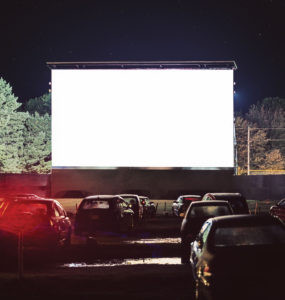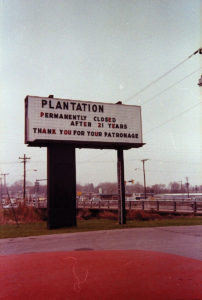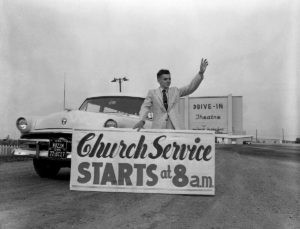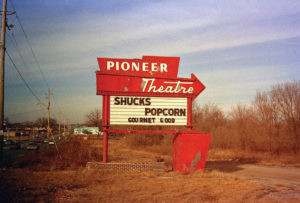Drive-in movie theaters, once a ubiquitous symbol of American car culture and family entertainment, evoke a powerful sense of nostalgia. For many, memories of summer nights spent under the stars, enjoying a movie from the comfort of their car, are cherished relics of a bygone era. In Des Moines, Iowa, like many cities across the United States, the story of drive-ins is a tale of boom, decline, and, for a dedicated few, a resilient revival. To truly appreciate the enduring appeal of these outdoor cinemas, let’s take a nostalgic journey back to the golden age of drive-ins in Des Moines, and explore the legacy of places like the Pioneer Drive-In Theater.

The rise of drive-in theaters in America was meteoric. Before the 1950s, they were a rarity. But in the post-World War II boom, fueled by car ownership and suburban expansion, drive-ins exploded in popularity. From the late 1950s through the 1960s, nearly 4,000 drive-ins illuminated the American landscape. Iowa, with its sprawling rural areas and close-knit communities, became fertile ground for these outdoor movie havens. Families flocked to drive-ins, drawn by the affordability, the casual atmosphere, and the unique experience of watching movies under the open sky. The iconic intermission announcements, beckoning moviegoers to the concession stand with catchy jingles like “Let’s all go out to the lobby and get ourselves a treat!”, became an integral part of the drive-in experience.
However, the golden age was not to last. As lifestyles changed and entertainment options diversified, drive-in theaters faced increasing challenges. Their seasonal nature, limited to warmer months and nighttime screenings, became a significant drawback in a world demanding year-round, 24/7 entertainment. While some drive-ins attempted to extend their season with car heaters, these cumbersome devices, reminiscent of the old speaker boxes, required windows to be kept ajar, hardly appealing to an increasingly comfort-oriented public. The rise of indoor multiplexes, offering climate control and stadium seating, further eroded the drive-in’s appeal. One by one, drive-ins began to close, many succumbing to demolition and redevelopment.
Despite this widespread decline, Iowa still holds a few flickering embers of the drive-in era. Among the handful of remaining drive-ins in the state are the Valle Drive-In in Newton, the Blue Grass Drive-in in Blue Grass, the 61 Drive-in in Delmar, and the Superior 71 in Spirit Lake. Sadly, others, like the Grandview Drive-In in Grandview, have been lost, unable to adapt to the digital projection standards that became essential for survival.
For those seeking a nostalgic cinematic experience near Des Moines, the Valle Drive-In in Newton stands as a testament to the enduring charm of outdoor movies. But to truly appreciate the full story of drive-ins in the Des Moines area, we need to delve into the history of those that are no longer with us, including the once-prominent Pioneer Drive-In.
Remembering Des Moines’ Lost Drive-In Theaters
Des Moines once boasted a vibrant drive-in theater scene, complementing the grand cinema palaces of downtown. These outdoor venues were strategically located on the city’s outskirts, areas that were then sparsely populated and dark enough for optimal movie viewing. However, as Des Moines and its suburbs expanded, these once-rural locations became engulfed by urban sprawl and light pollution, contributing to the decline of many drive-ins.

Alt text: A vintage photograph showcasing classic cars parked at a drive-in theater in Des Moines, Iowa, highlighting the nostalgic charm of outdoor cinema experiences.
The Plantation Drive-In: A Midwest Giant
Located near the intersection of 63rd Street and Grand Avenue in West Des Moines, the Plantation Drive-In was a true behemoth. Opening its gates on July 2, 1965, this 950-car theater boasted the largest movie screen in the Midwest at the time, an impressive 50 feet tall and 120 feet wide. Owned by Richard Davis, Clay Musk, and Bob Fridley (who also had ties to the Pioneer Drive-In), the Plantation aimed to provide maximum comfort, even offering 402 car heaters. However, its location in a flood plain proved to be its undoing. Despite initial optimism, repeated flooding ultimately led to its closure in 1986. Imagine the surreal experience, as filmmaker Mark Heggen recounted, of watching “The Poseidon Adventure” during a torrential downpour at the Plantation, the on-screen tidal wave mirroring the real rain outside, creating a disorienting yet memorable cinematic moment.

Alt text: A historical black and white photograph of the Plantation Drive-In theater sign in West Des Moines, Iowa, emphasizing its grand scale and classic mid-century design.
Southeast 14th Street Drive-In: Innovation and Longevity
Further down Southeast 14th Street, at 6000 S.E., stood the Southeast 14th Street Drive-In. Opening its gates on May 14, 1948, with the Marx Brothers’ classic “A Night in Casablanca,” this 600-car theater enjoyed a long and innovative run. Operated by Central States Theaters, it sought to maximize revenue beyond evening movie screenings. In a unique move, they hosted Sunday church services, allowing attendees to attend worship from their cars and even purchase coffee from the concession stand. Saturday swap meets and flea markets further diversified its offerings. Despite these efforts to adapt, the Southeast 14th Street Drive-In eventually closed on October 15, 1995, ending its run with a memorable triple feature: “Dangerous Minds,” “Judge Dredd,” and “Species.”

Alt text: An aerial view of the former Southeast 14th Street Drive-In location in Des Moines, Iowa, now occupied by a Menards store, illustrating the urban development that replaced these outdoor cinemas.
Capitol Drive-In: The Clown and the Casino
The Capitol Drive-In, located at 4646 N.E. 14th St., opened in 1952 and could accommodate 728 cars. Designed in a distinctive mid-century style by architect Lloyd Hirstine, it featured a playground, seated patio concession stands, and the memorable mascot, Cappy the Clown, adorning a gigantic neon sign. Rumor had it that travelers on I-80 mistook the brightly lit sign for a casino. Opening with “The Big Trees” and “Gallant Bess,” the Capitol Drive-In provided family entertainment for decades before succumbing to changing times and demolition in the early 1980s.
The Pioneer Drive-In: A Lingering Screen in Plain Sight
And then there was the Pioneer Drive-In, located at 2099 S.E. 14th St. Many Des Moines residents may unknowingly pass by a relic of this theater every day. The large RV park on Southeast 14th Street harbors what many mistake for a poorly placed billboard. However, this “billboard” is, in fact, the old movie screen of the defunct Pioneer Drive-In. Owned and operated by Richard Davis and Clay Musk, and possibly at one point by the Dubinsky Brothers of Kansas City, the Pioneer Drive-In opened on August 19, 1959, with a capacity for 700 cars. While the theater itself is gone, its screen remains a silent sentinel, a ghostly reminder of the drive-in era.

Alt text: A photograph of the old movie screen of the former Pioneer Drive-In theater in Des Moines, Iowa, now standing behind an RV park, showcasing the remnants of a bygone era.
Supporting the Legacy: The Valle Drive-In
While nostalgia for the past is natural, it’s crucial to avoid romanticizing it uncritically. The era of drive-ins had its own limitations, and entertainment has evolved significantly. However, there’s undeniable value in preserving unique cultural experiences. This is why supporting the remaining drive-in theaters is so important.
The Valle Drive-In, a short drive from Des Moines in Newton, represents the resilience of the drive-in spirit. By investing $80,000 in a digital upgrade, including a new projector, screen, and sound system, the Valle has ensured its survival in the modern age. Jeff Namminga, co-owner of the Valle Drive-In, eloquently captures the essence of its appeal: “A step back in time, a slower pace, less technology, and time with friends and family.” In a world dominated by fast-paced digital entertainment, the drive-in offers a refreshing antidote, a chance to reconnect with simpler pleasures under the vast Iowa sky.
The Pioneer Drive-In may be gone, along with many others in Des Moines, but the spirit of the drive-in lives on. By visiting and supporting places like the Valle Drive-In, we can ensure that future generations have the opportunity to experience the unique magic of outdoor cinema, a truly American pastime.

